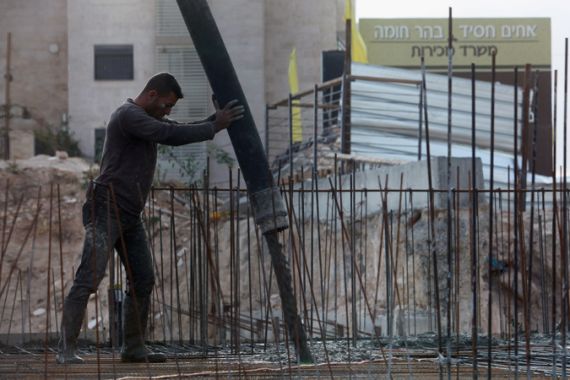Israel unlikely to extend ‘freeze’
Defence minister says settlement slow down is unlikely to continue in its current form after September 26 deadline.

 |
| Israel’s government has been under pressure from right wing settlers to lift the construction slowdown [Getty Images] |
Ehud Barak, Israel’s defence minister, has said a slowdown in West Bank settlement construction is unlikely to continue in its current form after it expires at the end of this month.
Barak also said on Sunday that he does not believe that Israel will entirely cancel the 10-month curbs.
He appeared to be leaving room for a compromise that might allow the Palestinians to continue the fragile direct negotiations that began in Washington last week.
Mahmoud Abbas, the Palestinian president, says he warned Binyamin Netanyahu, Israel’s prime minister, last week that he will leave the talks if Israel does not extend the slowdown.
Barak noted that Israel had permitted limited construction in settlements during the slowdown and he expects some construction to continue after the September 26 deadline.
‘Moderates disappear’
Meanwhile, Saeb Erakat, the chief Palestinian negotiator, said on Sunday that if the latest round of Middle East peace talks fail the moderate Palestinian leadership will “disappear”.
“We hope to bring (about) a Palestinian state. If we fail to bring it now, then I think we’ll go home,” he told the AFP news agency, adding that such a scenario would spell the end of the Western-backed Palestinian Authority.
The collapse of the moderate Palestinian leadership, which has been pursuing a peace agreement with Israel since the early 1990s, would leave Hamas at the head of the national movement.
“If we have an agreement (Hamas) will disappear, and if we don’t have an agreement then we will disappear,” Erakat warned.
“I really hope that we can make it, God willing.”
‘Original thinking’
Netanyahu told a weekly cabinet meeting on Sunday that “original thinking” would be necessary to reach a final agreement on the most intractable issues at the heart of the conflict.
“This time, in order to succeed, we will need to study the lessons of the 17-year effort at negotiations and to embrace original thinking, to think outside the box as it were,” he said, without providing further details.
He insisted, however, that he was “willing to achieve an historic compromise with our Palestinian neighbours so long as it maintains the national interests of the state of Israel with security first and foremost”.
The two sides relaunched direct peace talks at a Washington summit on Thursday after a 20-month hiatus, but the negotiations will face a major test later this month when an Israeli settlement moratorium expires.
Netanyahu and Abbas plan to hold bimonthly talks starting with a September 14-15 meeting in the Egyptian resort of Sharm el-Sheikh.
Hillary Clinton, the US Secretary of State, will attend the talks.